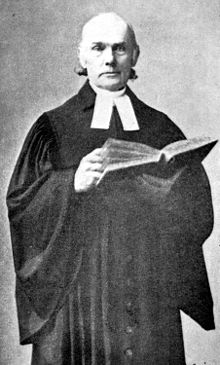Gustav Knak
Gustav Friedrich Ludwig Knak (* July 12, 1806 in Berlin ; † July 27, 1878 in Dünnow / Hinterpommern ) was a German Lutheran theologian , revival preacher , promoter of the missionary idea and hymn poet .
Live and act
Gustav Knak was born the son of Justice Commissioner Ludwig Knak and his wife Friederike Straube. After his father's death in 1819, he lived with his uncle, the Provost Straube, in Mittenwalde and attended the Friedrich-Wilhelms-Gymnasium in Berlin until 1826 . From 1826 to 1829 Knak studied theology at the Friedrich Wilhelms University in the Prussian capital, a. a. with Friedrich Schleiermacher and August Neander . In Berlin he also undertook his first poetic attempts.
In 1829 Knak became a religion teacher at the Schola Collecta in Königs Wusterhausen . From 1830 he worked on a renewal of the Protestant church hymn book. In 1832 he founded the Mission Reading Association in Mittenwalde and in 1833 passed the second theological exam in Berlin.
In distancing himself from the influences of idealism and Schleiermacher's theology, Knak was appointed pastor in Wusterwitz in the rear of Pomerania through the mediation of the revival preacher Hans Ernst von Kottwitz . Here he succeeded in a lively and faith-promoting work, and from here he was also the initiator of mission festivals to promote the missionary idea in the inner mission and the outer mission . He also joined the Lutheran Provincial Association for Pomerania in 1848 (under the direction of Superintendent Carl Meinhold , Cammin and Superintendent K. Wilhelm Otto, Naugard / Western Pomerania).
In 1850 Gustav Knak was appointed to the Bethlehem Church for the Bohemian Lutheran Congregation in Berlin to succeed Johann Evangelista Goßner . In Berlin he took over the leadership of numerous church missionary associations and worked in the Berlin Mission Society , today's Berliner Missionswerk . His pietistically oriented Christianity also met with strong resistance in Berlin, especially among enlightened theologians , even if Knak strictly adhered to the Lutheran creed against sectarian tendencies in the revival movement.
As a hymn poet , however, Gustav Knak found wide acceptance. His song collection Zionsharfe (1843) and his much-sung death song Let me go, let me go (1843 or 1845), which was set to music by Karl Voigtländer (1827–1858) around 1854 , became famous. The farewell song, Draw your paths in peace , was also included in the current Evangelical Hymnbook (No. 258). Perhaps the 3rd and 4th stanzas of the Christmas carol Es ist ein Ros sprung ( EG 30, GL 132) go back to Gustav Knak (more likely, however, is Friedrich Layriz ).

Gustav Knak often stayed in Dünnow, near Stolpmünde on the Baltic Sea , in Lower Pomerania . His daughter Maria lived here, who was married to the pastor Karl Ernst Preuss . Together with him he staged mission festivals or preached in the Dünnow village church with strong support from the population around Dünnow . On the occasion of such a stay, Knak died of a heart attack. When he said goodbye to Dünnow for the transfer to Berlin, a large number of his followers sang "his" song for him: Let me go, let me go . The burial took place in the Berlin cemetery of the Bethlehem community in front of the Hallesches Tor . The lattice grave has been preserved, but the grave cross is damaged.
Gustav Knak was married to Mathilde Wendt, the pastor's daughter from Klein Wubiser near Königsberg (Neumark) .
Works
- Simon Johanna, do you love me? Spiritual songs and sonnets . Berlin 1829.
- Zion harp. Spiritual songs and sonnets. For the good of the mission thing . Berlin 1840.
- Love for love. A small spiritual gift for charity . Werder 1849.
- “They saw no one but Jesus alone”. Sermons about the Gospels on every Sunday and feast day of the liturgical year . Berlin 1867.
Remembrance day
July 27 in the Evangelical Name Calendar .
literature
- Hermann Theodor Wangemann : Gustav Knak. A preacher of righteousness before God. An image of life from eternal life and a reflection of that in time . 1879.
- Otto von Ranke: Knak, Gustav Friedrich Ludwig . In: Allgemeine Deutsche Biographie (ADB). Volume 16, Duncker & Humblot, Leipzig 1882, pp. 261-263.
- Ernst Müller: The Protestant clergy of Pomerania from the Reformation to the present . Part 2, Stettin 1912.
- Hugo Zunker: Gustav Knak . In: Unser Pommerland , issue 11/12 1928, pp. 438–442.
- Wolfdietrich von Kloeden : Knak, Gustav Friedrich Ludwig. In: Biographisch-Bibliographisches Kirchenlexikon (BBKL). Volume 4, Bautz, Herzberg 1992, ISBN 3-88309-038-7 , Sp. 109-112.
- Ernst Arfken : Article, in: Wolfgang Herbst (Hrsg.): Composers and songwriters of the Evangelical Hymnbook (Handbook for the Evangelical Hymnal, Volume 2). Göttingen 1999, p. 180, ISBN 3-525-50318-0 .
Web links
- Memories of Johannes Dittrich on Gustav Knak
Individual evidence
- ^ Hans-Jürgen Mende : Lexicon of Berlin burial places . Pharus-Plan, Berlin 2018, ISBN 978-3-86514-206-1 , p. 221.
- ↑ Gustav Knak in the Ecumenical Lexicon of Saints
| personal data | |
|---|---|
| SURNAME | Knak, Gustav |
| ALTERNATIVE NAMES | Knak, Gustav Friedrich Ludwig (full name) |
| BRIEF DESCRIPTION | German Lutheran theologian, revival preacher, promoter of the concept of mission and hymn poet |
| DATE OF BIRTH | July 12, 1806 |
| PLACE OF BIRTH | Berlin |
| DATE OF DEATH | July 27, 1878 |
| Place of death | Dünnow , Western Pomerania |
